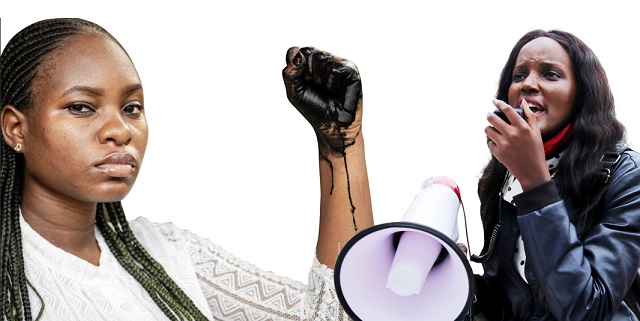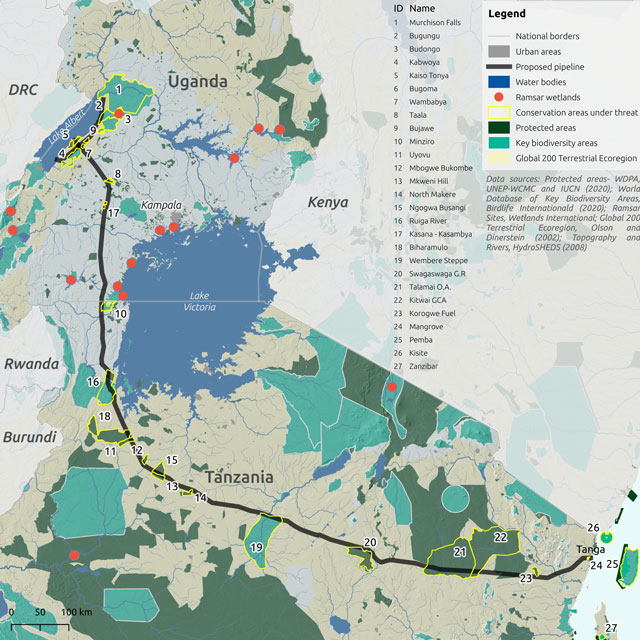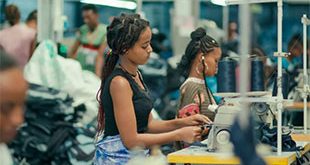
Why Pope Francis met two young Ugandan women activists determined to stop it
Kampala, Uganda | RONALD MUSOKE | Groundwork on keystone oil and gas infrastructure projects is beginning to take shape in western Uganda after TotalEnergies and CNOOC in February signed off the necessary Final Investment Decision (FID).
But for two young Ugandan women renowned in the global climate justice circles, Uganda’s oil project, particularly the East African Crude Export Pipeline, must be stopped despite the amount of money so far sunk in.
Vanessa Nakate and Hilda Flavia Nakabuye, two environmental rights activists who are affiliated to the global Fridays for Future movement, have been on a #StopEACOP tour across Europe during which they have delivered an intervention at the UN in Geneva, met with French government officials, given speeches to tens of thousands of people in Paris, and met with representatives at BNP Paribas to demand an end to the banks financing of fossil fuels.
They, together with other activists, recently met Pope Francis at the Vatican and senior European government officials in Berlin, Germany.
On March 29, Nakabuye was in Berlin to speak at the Berlin Energy Transition dialogue where she challenged top European decision-makers over their support for the EACOP. Her candid speech was listened to by senior government officials in Europe including; Annalena Baerbock, the German Minister for Foreign Affairs, Kwasi Kwarteng the British Secretary of State for Business Energy and Industrial Strategy, and António Guterres the Secretary-General for the United Nations.
“I have come here today (March 29) to remind you that the greed exhibited by your leaders and global north corporations is a danger to the lives of people in Africa. It is a danger to wildlife and a threat to future generations,” she told delegates at the Berlin conference.
“Despite promising time and time again to cut fossil fuels at home, European backing for the East African Crude Oil Pipeline is clear evidence the region continues to support devastating fossil fuel projects in the global south.”
“Europe developed by burning fossil fuels but that is not the path we want to take – Uganda and the rest of Africa wants to develop but not at the expense of nature and human lives.”
“We want people in Europe and around the world to know about the East Africa Crude Oil Pipeline and the StopEACOP campaign,” she said.
“We want them to know that their banks and other big European companies are supporting oil giant TotalEnergies, the corporation most responsible for pushing the pipeline ahead at any human cost, as long as they can turn a profit for themselves. We want to see this project stopped, as well as any new oil projects in Africa and around the world.”
Green light from Uganda
Although TotalEnergies have got the green light from both the Ugandan and Tanzanian governments to proceed with the oil projects after receiving their environmental and social impact assessment certificates, the campaigners say the EACOP threatens one of the most ecologically diverse and wildlife-rich regions in the whole world.
“TotalEnergies and its partners have opted for the lowest cost option, open cut trenching, for almost all water crossings—rather than meeting industry best practice.”
As part of her activism, Nakabuye visits schools and communities to urge young people and women to join the fight against climate change. She says the climate change crisis knows no borders. She has also created Climate Striker Diaries, an online platform to encourage digital awareness about climate change. One of her environmental concerns is saving Lake Victoria, which connects Uganda to several neighbouring countries in East Africa.
Vanessa Nakate, Nakabuye’s colleague, had a week earlier, on March 23, noted that her meeting with Pope Francis was crucial because “activists, environmental defenders and scientists have been reaching out to world leaders about the dangers the people and the planet are facing, for years now.”
“We’ve demanded that they take action but instead we continue to see continued investment in fossil fuels. It is time to escalate our efforts to end the age of fossil fuels and having the Pope acknowledge our campaign to StopEACOP lends even more moral authority to our demands,” she said.
“We want to see an end to the funding of any new fossil fuel projects like the East African Crude Oil Pipeline, and we want to see new investments in clean and sustainable energy,” Nakate added.
Pope Francis has been consistent in support of the global shift away from fossil fuels, providing a moral framework for a clean energy transition outlined within his 2015 encyclical ‘Laudato Si’ and more recently in 2020 when he urged the over 1.2 billion Catholics around the world to stop investing in fossil fuels.
The EACOP Project
The EACOP is a proposed 1,443km crude oil pipeline from Hoima in Uganda to the port of Tanga in Tanzania. Once completed, the pipeline will run alongside Lake Victoria basin, which is the continent’s largest freshwater reserve and the source of the Nile.

But despite several re-assurances from oil companies and government officials from Uganda and Tanzania, environmental campaigners say the likely risk of oil spills from the pipeline poses a huge threat to the livelihoods and welfare of tens of millions of Ugandans and Tanzanians.
They further argue that the project will in the long run generate over 34 million extra tonnes of carbon emissions every year, accelerating the climate crisis. Nearly a third of the pipeline will run through the Lake Victoria basin upon which more than 40 million people depend for water and food production.
It will also cross more than 200 rivers and streams and run through thousands of farms. Just one spill or leak could have catastrophic effects on these vital fresh water sources and the millions of people that depend on them.
The campaigners say the likelihood of a spill or leak could not only result from accidental damage or poor maintenance, but also because the pipeline will traverse an active seismic zone that regularly experiences earthquakes.
On its way from Uganda to the Tanzania Coast, the pipeline will disturb nearly 2000sq km of protected wildlife habitats, including the Murchison Falls National Park, the Taala Forest Reserve, the Bugoma Forest, and the Biharamulo Game Reserve. These are multiple reserves critical to the preservation of vulnerable species such as the eastern chimpanzee and African elephants which are both red-listed by the International Union for Conservation of Nature.
The campaigners say the construction and operation of the pipeline particularly poses a “severe threat” to wildlife habitats and corridors. The “edge effect” of creating a massive line of wide open space will become a major barrier for many animals—particularly mammals and birds—from accessing food on the other side.
The pipeline will, for instance, run through numerous important habitats and nature reserves—home to a number of iconic and endangered animals, such as lions, elands, lesser kudu, buffalo, impala, hippos, giraffes, roan antelopes, Sitatunga, sables, zebras, aardvarks, and the red colobus monkey.
#StopEACOP Campaign
On the StopEACOP website, a dedicated platform for the campaigners, they say the French oil giant; TotalEnergies and the China National Offshore Oil Corporation (CNOOC) are on the brink of building a massive crude oil pipeline right through the heart of Africa that will tip the world closer to a full-blown climate catastrophe.
The campaigners say the project will fuel climate change by enabling the extraction of oil which will generate over 34 million tonnes of CO2 emissions every single year. They say more than one million people have already raised their voices against the project. They want the flow of money for the project to be stopped.
“Building the biggest heated pipeline in the world is expensive work. Fortunately, TotalEnergies and CNOOC cannot do it alone—they need support from investors, banks and insurance firms around the world,” a statement on their website reads in part.
“It’s our job to highlight the risks, crank up the pressure in boardrooms and make sure EACOP is starved of the corporate and political support it needs. Not only will EACOP devastate communities, endanger wildlife and cook the planet, but it is economically reckless.”
The campaigners say the future of East Africa relies on building sustainable, diversified and inclusive economies—not by letting huge multinational corporations extract resources and keep the profit.
The campaigners argue that investing in renewable energy, tourism, small scale agriculture, fishing and reforestation programmes will provide far more jobs to local communities, a wider range of economic benefits for East Africa and a cleaner environment which will benefit the whole world. And it appears the campaigners are being heard.
At the Berlin event, Baerbock the German Minister for Foreign Affairs responded to Nakabuye saying,“It is our global responsibility to make sure that we don’t export our energy crisis to other countries and that our transition will be socially just – and that worldwide.”
Up to 18 French MPs from seven parliamentary groups have recently come out to criticise the EACOP project while the world’s fourth largest re-insurers, Hannover RE and SCOR announced they will not be supporting the project. Fifteen banks and five re-insurers have ruled out support for the pipeline.
On March 17, the world’s fourth largest (re)insurer SCOR announced that it “will not be providing insurance or facultative reinsurance in respect of this project,” joining 15 major banks that have ruled out support for the pipeline. However, several financial institutions that continue to support EACOP include: Munich RE, Allianz, AIG, Standard Bank, ICBC, JPMorgan Chase, MUFG, Standard Chartered, Citi, Deutsche Bank and SMBC.
Diana Nabiruma, from the Africa Institute for Energy Governance (AFIEGO), a non-profit that advocates for responsible investment in Uganda’s oil and gas industry recently noted that the environmental campaigners’ European tour has helped to mobilise the youth and activists in Europe to create pressure on TotalEnergies, banks, insurers, the legal system and others to stop the EACOP.
“In Uganda, we don’t have much space to mobilise and engage in actions such as protests that are needed to create pressure. We hope that the youth and activists we have engaged can continue to create pressure through protests, financial advocacy, engaging insurers and more,” Nabiruma said.
****
 The Independent Uganda: You get the Truth we Pay the Price
The Independent Uganda: You get the Truth we Pay the Price




Environmental Services
WE OFFER ENVIRONMENTAL CONSULTANCY FOCUS
Land and water contamination
Waste management policies
Environmental management systems
Air assessment
Environmental impact assessment
Environmental audit
The management of legislative issues for clients
The development of conceptual models (identifying and considering potential contaminant sources)
On-going communication with clients, inspectors and regulators
Identifying previous activities and any contamination when assessing property.